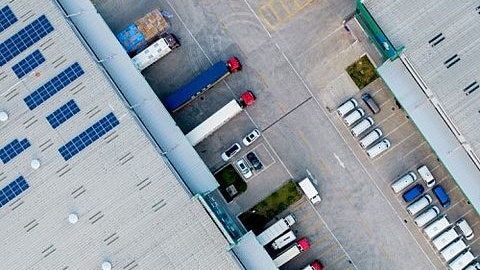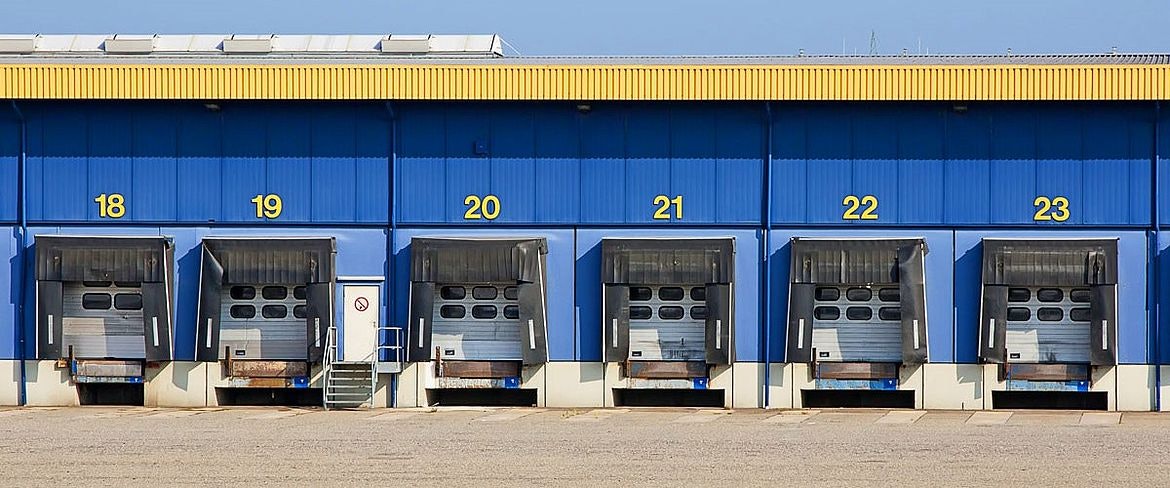3PL: 3rd Party Logistics explained

Companies that are not pure service providers but sell specific "physical" products are dependent on functioning logistics. The aim is usually to deliver the goods to the customer in the contractually agreed condition and quantity at the agreed delivery time. This process can either be organised entirely in-house or outsourced to external service providers. 3rd party logistics (3PL) describes the range of services provided by an external logistics service provider who takes over extensive parts of the distribution process. In the following blog, we take a closer look at the special features, advantages and disadvantages of 3PL logistics.
What is 3PL - definition and characteristics
When it comes to the question of the extent to which logistics is handed over to an external company, the abbreviations from 1PL to 5PL describe an increasing degree of outsourcing.
With 1PL Logistics, a company takes care of the delivery of their goods themselves, i.e. they use their own warehouses, pack and pick the goods with their own employees, load them onto their own trucks and deliver them directly to their customer.
With 2PL Logistics, an external logistics company is commissioned to handle a specific section of transportation within the supply chain. The simplest variant is transportation from the warehouse to the customer using the transport vehicles of the contracted logistics provider.
The range of tasks for external services is significantly expanded with the 3PL Logistics discussed in this blog text. In principle, a company can freely choose the scope of services, the typical "basics" are warehousing, packaging and transportation management, which the 3PL provider takes over.
With 4PL or 5PL, the degree of networking between the service provider and the company increases so that the providers manage the entire supply chain and even operate the strategic alignment and optimisation of the supply chain. This requires a high level of transparency and insight into internal processes and company key figures by the 4/5PL service provider.
Classic services of a 3PL company

Warehousing: storage, management and inventory control of goods
Transportation management (shipping, delivery): organisation and execution of transports, including route planning and tracking or freight tracking
Picking and packing: compiling individual orders and preparing them for dispatch (e.g. labeling, packing)
Returns management: processing returns including inspection, restocking or disposal
Customs clearance and documentation: preparation of customs documents and handling of customs clearance, including administrative procedures and customs formalities
Interesting additional benefits of 3PL:

Dangerous goods logistics and shipping temperature-sensitive goods
Modern IT solutions including warehouse management systems, Track and Trace or EDI connections
Financial services from invoicing and payment processing to debt collection
Assembly, quality control, product finishing or repairs
What advantages does a 3PL service provider offer?
As a company, you are an expert in the manufacture of a product, but by no means an expert in the complex issue of logistics. By commissioning a 3PL service provider, you benefit from the expertise of a logistics specialist who combines many years of experience with powerful resources. The provider's experience should not be underestimated. In addition to general principles and best practice knowledge, the 3PL service provider is also able to optimally adapt the various tools and resources to the individual requirements of a company.
Also important: To what extent is the 3PL provider familiar with the respective industry? Can they look back on many years of experience, for example in the automotive, health care products, fashion or furniture logistics sectors? This experience pays off in all areas of the supply chain, from warehousing, packaging and order picking to transportation.
Warehousing, picking & packing
With 3PL, you use the storage capacities of the service provider. There is no need to build or acquire your own storage facilities, and therefore no need for the associated investment. Personnel management for warehouse workers, pallet management, procurement, operation and maintenance of forklift trucks and other equipment - all this is eliminated. Fixed costs become variable costs. This increases flexibility. At the same time, you don't have to worry about whether the warehouse is too large and therefore uneconomical, or whether you are reaching the limits of your capacity. The 3PL provider can take care of scaling issues. Depending on the contract, you only pay for the actual storage space used.
Modern merchandise management, fast order picking
At the same time, a modern warehouse not only means pure storage space, but also quick access to the goods. Automated warehouses work faster and with fewer errors. A state-of-the-art inventory management system is also advantageous - for example, for mapping live stock levels in e-commerce. Fast order picking and error-free outgoing goods are also among the characteristics of a good warehouse management system, which has often worked optimally over a certain period. The digital technology used is often expensive or even a powerful in-house development from the provider. Ideally, the digital infrastructure of the 3PL company can be seamlessly connected to that of the client.
Cope easily with staff shortages
A 3PL provider has the advantage over smaller companies in that they can better compensate for staff absences due to illness, for example. If a small team of warehouse employees or even the driver falls ill, the head of the company could suddenly find themselves behind the wheel of the truck or packing boxes.
More favorable conditions due to economies of scale
A large logistics company can negotiate significantly better conditions thanks to the purchase of higher quantities, whether for packaging materials from cardboard boxes to parcel tape, pallets or labels. It also has purchasing advantages for services, for example in relation to freight costs. Even cleaning and energy costs can be cheaper for the 3PL service provider. The commissioning company also benefits from these cost advantages (economy of scale), as the 3PL service provider can make an attractive offer and still achieve their corporate goals.

Transportation management
A logistics company offers significant added value when it comes to transporting goods to the customer or the agreed delivery location. As an expert in freight services, the provider can not only offer particularly favourable transport conditions but also ensure the reliability and punctuality of the delivery. The 3PL provider can either rely on their own transport vehicles or on a network of proven partners: transport companies, freight forwarders and other service providers.
The increased demands on delivery times, including overnight delivery and real-time freight tracking, can often only be met by an experienced logistics specialist. At the same time, the economy of scale and the volume advantages that a large 3PL service provider has and can pass on the favourable freight rates accordingly also come into play here. The network and experience enable the 3PL service provider to quickly find a solution in the event of delays, strikes, weather problems or vehicle breakdowns.
As with warehouse management and warehousing, there is also a large amount of organisational work involved here - purchasing and maintaining transport vehicles, personnel management and training costs (drivers, etc.), setting up IT systems and more.
An experienced logistics company not only makes transportation cheaper, but also gives the supply chain more stability, transparency and resilience.
Flexibility during peaks in demand
How quickly and efficiently your warehouse management works can play a subordinate role when the order situation is relaxed. However, extreme peaks in demand often occur, either predictably in seasonal business, such as around Christmas, or unexpectedly - for example, when a marketing campaign suddenly increases demand. If there are significant delays in delivery due to a lack of capacity or inefficient processes, dissatisfied customers are inevitable. An experienced, efficient 3 PL company is also characterised by its ability to master fluctuations in demand with confidence.

General: Reduction of complexity
However, the "reduction of complexity" is also highly attractive. Countless small areas that you would normally have to manage yourself are now the responsibility of the 3PL provider, notably:
Human resources management: hiring and training employees, finding replacements in the event of sickness absence or dismissal, managing social benefits, etc.
Warehouse management: organisation and operation of an efficient warehouse that keeps your products in good condition and enables fast and error-free picking and packing processes. With all facets from correct real-time stock levels to the operation and maintenance of forklifts and protection against theft to appropriate labeling.
Returns management: this area can present a complex challenge, especially in the e-commerce sector. The tasks here range from inspection and reprocessing to disposal or return to stock.
Transport management: the length of the route, determining the most economical route, changing the means of transport (e.g. from truck to ship), insuring the freight, managing the fleet, but also the sensitivity or bulkiness of the goods can make the organisation of the transport complex. If customs borders are also crossed, further demanding challenges arise.
The advantages of a 3PL service provider summarised
With a 3PL service provider, you outsource business areas that are complex and cost-intensive. Instead of setting up warehouse management and logistics yourself, which first have to become established, you benefit from the "well-oiled machine" of a specialist who has sometimes acquired extensive expertise over decades. The more complex and extensive a company's business, the more interesting the expert knowledge of a 3PL company becomes, including resources from machinery to IT.
An experienced 3PL provider enjoys volume advantages in all areas from packaging materials to machinery and equipment to favorable freight rates. This creates a win-win situation where you as a company can reduce your costs and your provider can operate economically. At the same time, you will be able to supply your customers faster and more reliably.
Investments in a vehicle fleet or warehouse, including the associated personnel and expensive IT systems, tie up financial resources. At the same time, these resources cannot be easily "scaled" ad hoc - for example, when the warehouse reaches its capacity limits. With a 3PL service provider, you only pay for the systems and services you need; there are no "unused" resources such as the truck you bought for EUR 100,000 that you don't even need for the current order volume, or "orphaned" warehouse space. At the same time, the 3PL company can provide additional resources much more easily, whether for logistics or warehousing.